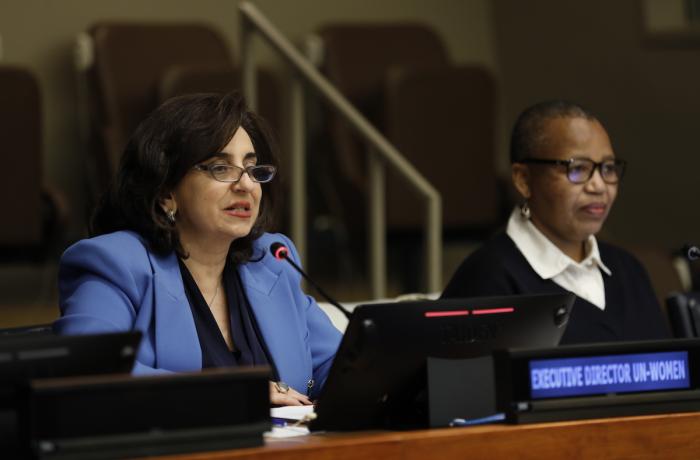Ayesha Amin is a Pakistani social entrepreneur and IT and gender activist. She is the founder of Baithak—Challenging Taboos, a youth- and women-led organization that works to increase access to information about sexual and reproductive health and rights.
Baithak is a Generation Equality Commitment Maker. Ayesha emphasizes the necessity of including young people—and young women in particular—in the decision-making processes.
That will affect their future because she has firsthand experience with the discriminatory structure of the tech industry. “There is no alternative,” she asserts.
Many women have historically been ignorant about their own bodies due to the taboo around sexual and reproductive health and rights.
As a result, they are effectively robbed of their right to bodily autonomy, as Ayesha points out: “When women don’t have access to knowledge, they are not able to make informed decisions about their bodies.”
In addition to the stigma, limited mobility and a lack of funding keep many people from getting vital medical services.
FemTech, a word for technology created to improve women’s health, can assist in removing current obstacles to information and care.
However it frequently leaves out those who require assistance the most: According to Ayesha, “the majority of the FemTech applications that are now available.
Favor women who are from socially and economically affluent groups.
Even these alternate kinds of healthcare are still out of reach for women who live in remote areas, aren’t computer literate. Or don’t make enough money to subscribe to paid apps.
Ayesha underlines that “we are leaving women and girls in marginalized places far, far behind” as we work to overcome the gender gap in digital access.
Because of this “gap within the gap,” marginalized women are not included in tech that is advertised as being accessible.
“Investments in solutions that can localize technology and make digital models inclusive for girls and women who are in these marginalized communities are desperately needed,” the author claims.
Introducing Gul, Baithak’s newest endeavor, an AI-powered voice assistant that will utilize. WhatsApp to assist in educating young people about concerns related to reproductive health in regional languages.
In order for consumers to “have a friend in terms of this voice assistant that they can ask for this information.”
The team gave their voice assistant a common gender-neutral name, according to Ayesha.
Gul is an effort by Baithak to broaden its technological effect.
“The idea was to create safe spaces for women to come together and discuss and learn about issues related to their sexual and reproductive health,” Ayesha explains.
The organization started with in-person sessions held in communities throughout the region. Nonetheless, they were still unable to reach a lot of areas.
We were aware that we had very little access, she recalls. “We weren’t able to be everywhere.
So, we sought to create a system that would allow women and girls from underrepresented communities to access high-quality information in a discreet manner.
The COVID-19 pandemic’s start highlighted the necessity for virtual resources. Women in other areas began contacting us very aggressively on Whatsapp. Because we were unable to personally visit them, according to Ayesha.
The floods that wreaked havoc in Pakistan last year served to highlight the project’s importance even more.
There will continue to be crises of this nature. Yet, technological solutions can lessen the harshest effects of their effects.
The objective is to employ this voice assistant for women in climate emergencies, where it is more challenging for them.
To acquire reliable information and make decisions about their reproductive health, according to Ayesha.
According to Ayesha, men predominate in the tech industry. This shouldn’t deter female activists, though: “At the beginning, it could look like you are a misfit.”
Yet “this is exactly why you need to be there,” she adds.She still has faith that technology will get better in the future.
There is a lot of potential for these venues to diversify and become safer for people of both sexes, not just women. These environments have the potential to be much more empathic.















